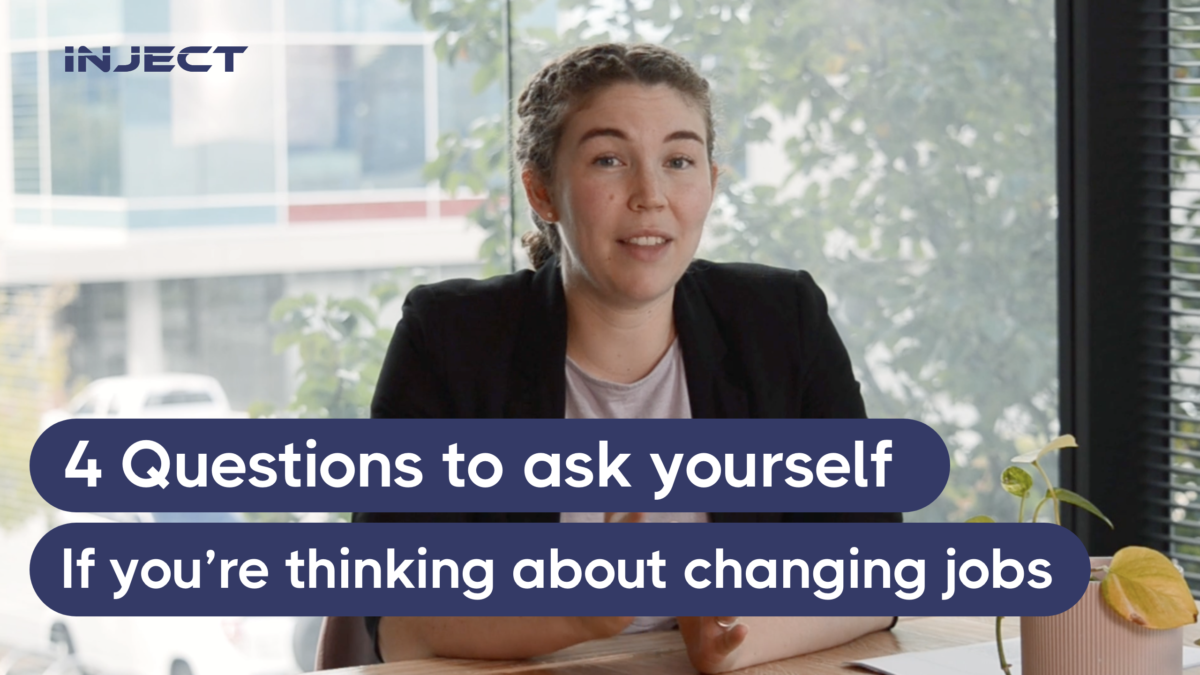This blog is a direct transcription of our Youtube video: 4 Questions To Ask Yourself If You’re Thinking About Changing Jobs
Found yourself wondering whether you should take advantage of the current job boom? Scrolling on seeking but not quite clicking the Apply Now button? Stay tuned to hear four questions you should ask yourself whether to stay or where to go.
Hi my name is Kate and I’m a senior consultant here at INJECT and our sister company beyond HR. I work with a number of small to medium businesses to help them hire the right person, and that includes a lot of graduates, probably like you. I’ve been a graduate myself a little while ago now, so I understand the kind of things you’ll be thinking about when looking to make sure the role you’re in is the right one for you and whether you should think about moving on from that role.
How do you know whether it’s time to move on from your first or second graduate job?
At uni and even through high school, we’re sold this story that that first job out of our studies is going to be an amazing, exciting adventure with all these exciting training and development opportunities. But what we’re not told is that there actually are a lot of challenges involved with learning new things. Learning a lot of new things all at once is really hard and there are no criteria to follow anymore as there were at uni. So today we’re going to go through the four questions that you should ask yourself before thinking about moving on from your next job.
Are you learning, and who are you learning from?
You’re in the formative years of your career. The people that you learn from now are probably going to shape how you think and feel and do things in a professional environment later on. So for example, don’t just ask your mates what they’re feeling and thinking because chances are they’re probably thinking the same thing as you. this is really hard and is this actually right and are we in the right environment? What you should be doing is looking for a mentor or someone small senior in your life with more work experience and asking them what their advice would be and what they did in your situation.
Is there a clear structure to your career and specific performance metrics for you to follow?
Secondly, are you clear on your performance metrics and what is expected of you on the job? First things first, what I would do in this situation is go to your manager and ask them for a copy of your position description. If there are any KPIs then come back and answer this question. You wanna be clear on where you’re going and what you’re doing to get there.
Are your personal values aligned with the company values and does the culture reflect them?
Next, does the company you work for have a strongly defined set of values? and do people actually follow those values in that company? A lot of companies have values, but most of it is just buzzwords. Now what you want to be looking for are actions, and decisions that people make that are reflective of the values of the company. Do you feel like those people in that company, you can respect they’re transparent about where they’re going and what they’re doing and are you receiving feedback based on those values as well?
Are you being paid fairly?
Finally, the big question is, are you being paid fairly? Now, this topic could be a whole video in itself and is the topic of many conversations. One thing that I recommend you keep in mind as a graduate and when you’re thinking about pay is that promotions and pay rises should not be a priority for you at this moment. What you want to be focusing on is, is this role provides me with a clear framework and the right training and development opportunities, to be able to progress in my career long term. I’ve seen so many graduates, and high potential graduates as well miss out on some fantastic career opportunities because their parents or this mate at uni told them that they need to negotiate as high as possible or ask for way above market rates just because that’s what they’ve been told to do by someone who doesn’t really understand how this works.
Final thoughts
Now as you might have guessed, the grass is usually greener where you water it. You’re only 6, 12 months into a career that could last you 40 to 50 years. At the moment, you want to be able to look back on this time and go yep I made decisions for a role that whilst challenging and unfamiliar, I got through it, I learned new skills, and I developed myself and my personal effectiveness and I didn’t just take that job because it offered an extra five thousand dollars or because it had a ping pong table. You want to say, Hey I made the right decision and I’m really happy with where my career has taken me because I was true to my values and my career reflects that.



